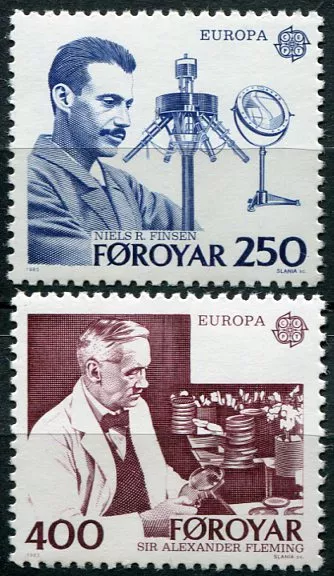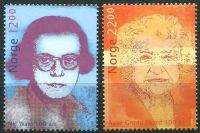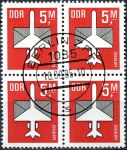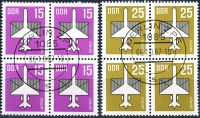- Home
- Philately: postage stamps
- Philately: stamps all over the world
- Europe
- Faroe Islands (Denmark)
- (1983) MiNr. 84 - 85 ** - Faroe Islands - EUROPA
(1983) MiNr. 84 - 85 ** - Faroe Islands - EUROPA
Europe - Denmark - Faroe Islands - postage stamps

| Code: | FO-84-85 |
| Producer: | Faerské ostrovy |
| Price: | 0,78 EUR |
| Availability: | In Stock |
| Stock: | 7 Pcs |
| Year: | 1983 |
| Condition: | ** |
| Catalogue no. (MICHEL): | 84 - 85 |
| Cat. number (St. Gibbons): | 83 - 84 |
| Cat. number (Yvert et Tellier): | 78 - 79 |
| Catalogue Price: | 1,5 ,- Mi€ |
Name: 250 oyra
Niels R. Finsen was a Danish physician who became famous for his groundbreaking research in the field of light therapy. He was born in Iceland on December 15, 1860, but his scientific career developed in Denmark, where he received recognition for his contributions to the field of dermatology. Finsen is best known today for his discoveries in the field of phototherapy, the use of light to treat various diseases.
In 1903, Finsen was awarded the Nobel Prize in Physiology or Medicine for his research in light therapy, particularly for developing a method of using ultraviolet light to treat skin diseases such as lupus vulgaris. This type of phototherapy, known as Finsen therapy, has had a profound impact on modern dermatology and has been considered revolutionary.
His research, however, was not limited to the treatment of skin diseases. Finsen was also interested in treating eye diseases, developing a special lamp that used specific wavelengths of light to treat retinal diseases. His work had a broad impact on the development of therapeutic methods and provided new opportunities for physicians in the field of light medicine.
Finsen was fascinated not only by scientific experiments but also by humanitarian principles. Despite the severe illness that befell him, Finsen continued his research and became an inspiration to many scientists and physicians. He died in 1904 at the age of 43, but his legacy in the field of medicine and phototherapy remains alive today.
Note: 400 oyra
Alexander Fleming, a Scottish physician and microbiologist, is one of the greatest discoverers in the history of medicine. He was born on August 6, 1881, in Lochfield, Scotland. His most famous discovery is penicillin, the first antibiotic, which revolutionized the way we treat infections.
Fleming's experiments with bacteria and fungi began in 1928, when he inadvertently discovered in the laboratory that cultures of bacteria were being destroyed by a particular fungus, which he later identified as Penicillium notatum. This discovery led to the development of penicillin, the first antibiotic capable of effectively treating bacterial infections such as pneumonia, sepsis and tuberculosis.
Fleming's work did not lead to the immediate diffusion of penicillin, but his discovery laid the groundwork for further research. In 1945, he was awarded the Nobel Prize in Physiology or Medicine for this groundbreaking discovery, which he shared with Howard Florey and Sir Ernst Chain, who were instrumental in developing penicillin for wider use.
Fleming also studied bacterial resistance, a problem he became aware of during his lifetime. His discovery showed the importance of the proper use of antibiotics, which medical science now understands to be crucial in the fight against antibiotic resistance.
Fleming died on March 11, 1955, but his legacy lives on. His discovery of penicillin saved millions of lives and is still considered one of the greatest advances in the history of medicine.
Frequently Bought Together - (1983) MiNr. 84 - 85 ** - Faroe Islands - EUROPA

| Price: | 5,62 |
| Discount: | 18,8 % |
From the Same Category - (1983) MiNr. 84 - 85 ** - Faroe Islands - EUROPA
Europe - Denmark - Faroe Islands - postage stamps
Europe - Denmark - Faroe Islands - postage stamps

